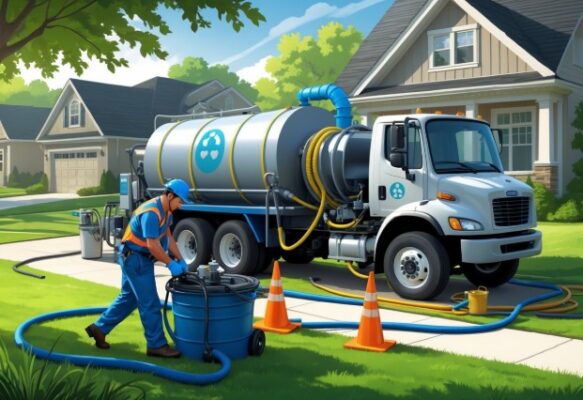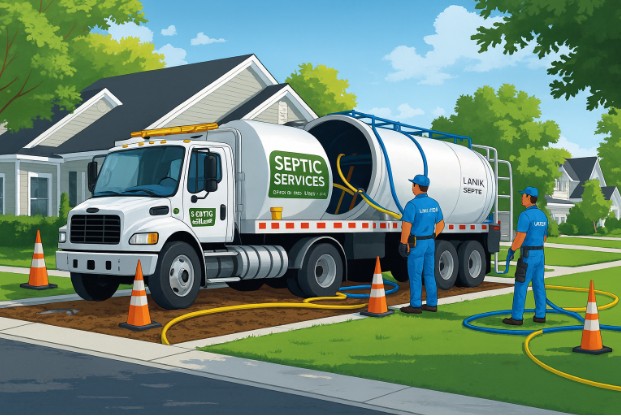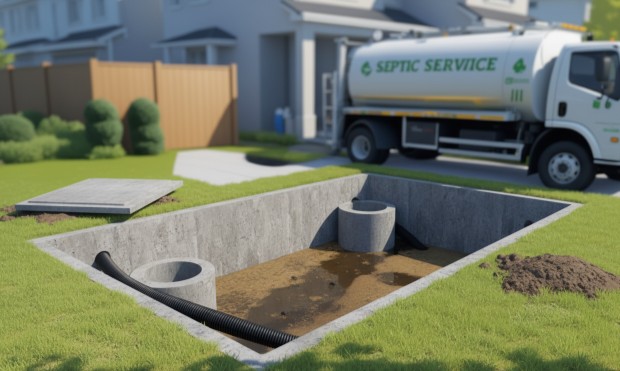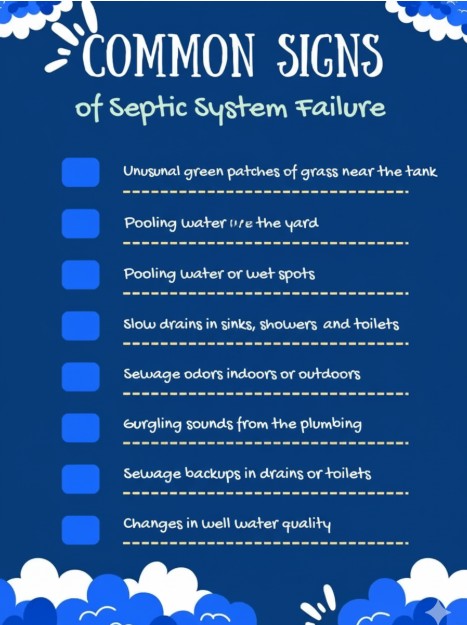

License A & C-42 #458947
Originally published: February 2023 | Updated: October 2025

When a septic system fails, you’ve got an urgent mess on your hands—one that doesn’t care about business hours.
Emergency septic services respond quickly when septic problems require prompt action to prevent costly damage and health risks from escalating.
Sewage backups, overflowing tanks, and complete system failures can occur at any time, day or night. These issues threaten your property—and honestly, your health—if you ignore them.
Getting a quick response from real pros stops minor headaches from turning into wallet-draining disasters. 24/7 emergency septic services mean you’ll get help when you need it most.
It’s worth knowing what these services actually do and how to find them, especially when you’re stressed out. Spotting the warning signs early can save you a lot of pain later.

Emergency septic services provide 24/7 response for backups, sewage surfacing, alarms, or flooded drainfields.
Licensed techs isolate the failure, assess tank/baffles/pumps, and take immediate steps (e.g., controlled pumping, jetting, temporary bypass) to stop health risks and property damage—then document next-step repairs
Key Services Include:
You can call emergency septic services when something goes wrong and you need help right away. Most of these companies answer the phone 24/7, which is a genuine relief when things go awry.
They arrive at your location with the necessary equipment to pump tanks or repair broken parts. It’s a lot like regular septic work, just with a lot more urgency.
These professionals focus on wastewater systems that have malfunctioned. They handle everything from minor clogs to complete breakdowns.
What are the big differences from routine service? Timing and cost. Emergency calls usually cost more after hours, but you get help right when you need it.
Most septic companies offer both emergency and regular maintenance, so you’re not left hanging when things get urgent.
Septic backup right now? Lanik Septic offers 24/7 emergency inspections to quickly identify problems and protect your home. Stay safe—contact us today to schedule service.
If you’re ready to get started, call us now!

A septic emergency requires a prompt fix to avoid significant repair bills. Wait too long, and what started as a tiny issue could easily become a massive headache.
Financial Impact of Delayed Action:
| Response Time | Typical Cost | Potential Damage |
| Immediate | $300-800 | Minor repairs |
| 1-2 days | $1,000-3,000 | System damage |
| 1+ weeks | $5,000-15,000 | Full replacement |
If sewage backs up inside, you’re looking at ruined floors, walls, and furniture. That cleanup costs way more than fixing the septic issue itself.
Raw sewage is loaded with nasty bacteria and viruses. The longer it sits, the more dangerous it gets.
Kids and older adults are especially at risk. Sometimes, just a few hours of exposure is enough to make someone sick.
Acting quickly prevents minor septic issues from escalating into health emergencies. Sure, emergency service costs more than routine care, but it’s still way less than a system replacement.
Insurance doesn’t always cover the full cost of sewage backup damage. Most policies have strict rules for septic claims, so don’t count on a big payout if you wait too long.

Multiple-fixture slow drains or backups, sewage odors, alarm lights on pumps/timers, soggy or unusually green patches over the drainfield, or surfacing effluent mean active failure—treat as urgent and call 24/7 help.
Whole-house issues typically indicate that the septic system itself is failing. If you see multiple drains backing up—toilets, sinks, showers—it’s time to call for help.
All the drains slow down, and you start smelling foul odors from every room. That’s not a coincidence.
Single-fixture problems are often just local plumbing clogs, not complete septic failure. If only one toilet acts up while the rest work, you might have a blockage in that line.
One slow sink with everything else fine? Probably a pipe issue. Still, keep an eye on it.
If you ignore single-fixture clogs, they can develop into more significant septic problems. But once you spot trouble in several places, you’re likely looking at septic tank failure.
Location details really help emergency techs prepare the right gear and assess the urgency of your situation. Let them know which fixtures are slow or backing up.
Is the problem inside, outside by the tank, or out in the yard? Standing water or wet grass near the drain field means serious trouble.
Timing matters too. Tell them when you first noticed the symptoms, and if things worsen at certain times of day.
Heavy rain can overwhelm your system for a bit, but if problems stick around after dry weather, you’re probably dealing with an absolute system failure.
Dispatchers use your information to determine how quickly to send help and what tools to bring with them. The more details you provide, the better they can assist you.
Emergency septic services address a range of urgent issues that can’t wait. These issues can wreck your property and put your health at risk if you don’t act fast.
Sewage Backups top the list. When sewage backs up into your toilets, sinks, or tubs, you’re dealing with a real mess.
System overflows appear as wastewater pooling around the tank or drain field. It smells awful and is a hazard for anyone nearby.
Septic Tank backups occur when the tank becomes too full or an obstruction prevents the waste from flowing. This is a routine emergency call for septic companies.
Alarm System Alerts mean something’s wrong with your septic system. If your system alarm goes off unexpectedly, don’t ignore it.
Complete System Failures are as bad as it gets. When major parts break or stop working, you need a pro right away.
Pipe Blockages can send waste back into your house. Tree roots, junk, or busted pipes are usually to blame.
Pump Malfunctions are a big deal for systems that rely on pumps. If the pump quits, wastewater can’t move through the system.
Emergency septic services address these problems with repairs, pumping, or even system replacement, depending on the severity of the issue.
Need fast relief? Lanik Septic provides immediate emergency pumping with licensed technicians and documented results. Restore flow quickly and safely—contact us now to schedule service.
If you’re ready to get started, call us now!
When you’re in a septic emergency, you need to act fast. Finding a reliable septic service provider means quick thinking and a bit of smart research.
Online directories can help right away. Septic Directory provides comprehensive listings of verified professionals in every state, featuring ratings and contact information.
Online Search Strategies:
Some companies highlight their 24-hour emergency availability. Many septic pumping services now have round-the-clock teams available for urgent calls.
Key Verification Steps:
Visit company sites to see their emergency protocols and where they’ll travel. Professional emergency septic services typically offer pumping, cleaning, repairs, and even replacements, available 24 hours a day, 7 days a week.
Contact several providers to compare their response times and pricing. It’s honestly smart to keep a list of pre-screened companies before you’re in a jam.
Some legitimate providers can actually reach you the same day, sometimes within just a couple of hours if it’s a genuine emergency.
Stop all water usage immediately if you suspect a septic emergency. This keeps more sewage from flooding an already strained system.
Evacuate any affected areas and avoid touching sewage if possible. Raw sewage is a nasty mix—bacteria and viruses that can make you seriously sick.
Essential Safety Equipment:
Don’t step into standing sewage unless you’ve got the right gear. The fumes from septic waste can be toxic and really dangerous to breathe.
Keep children and pets away from any contaminated areas. They’re especially at risk for infections from septic waste.
After Emergency Septic Pumping:
Take photos of the mess before you start cleaning up. This could help with insurance and document the extent of the damage.
Wait for the professionals to confirm that your system is safe before using it again. Emergency septic services will test various components to ensure everything’s working properly.
Post-Emergency Steps:
Ventilate rooms well as you clean up. Open some windows, run a fan, and help clear out those nasty smells and gases.
Heavy rain can spell real trouble for septic systems. Oversaturated soil stops drain fields from absorbing wastewater, and that can back things up right into your house.
Immediate Risks During Heavy Rain:
When groundwater seeps into the system, it raises the water level, triggering alarms. That’s a pretty clear sign the system just can’t keep up.
Critical Safety Rules:
| Do | Don’t |
| Call your health department | Flush or use the sewage system during flooding |
| Redirect roof drainage away from the system | Drive over a wet drainage field |
| Wait until the soil dries out | Dig into a flooded drain field |
If you own property, don’t use the sewage system until the water in the absorption field drops below your house level. That’s one way to avoid making things worse.
Heavy rainstorms often cause flooding and clog drainage fields. When the soil’s soaked, it just can’t take more effluent, so you’ll see pooling on the surface.
Essential Actions:
If your system appears stressed during heavy weather, consider having a professional inspect it. Sometimes, it’s just not worth the risk.
Emergency septic problems can pop up anytime—usually when you least expect them.
It helps to have a plan ready so you can act quickly if something goes wrong.
Key steps include:
Many companies now offer 24/7 emergency septic services for urgent issues. A prompt response can help you avoid costly damage.
It’s wise to recognize the warning signs before things escalate. If you notice bad smells, slow drains, or weird wet spots in your yard, something’s probably up.
Regular maintenance actually prevents most emergencies. Pumping every 3-5 years keeps things running smoothly, even if it feels like a chore.
Finding local emergency services in advance can save you precious time later. Many areas have a directory of septic service providers so you can pick a trusted company before disaster strikes.
Yeah, emergency septic services cost more than routine maintenance. However, acting quickly almost always saves you money compared to fixing significant damage or dealing with health risks.
Don’t risk another crisis. Lanik Septic delivers reliable emergency septic repairs that keep your system code-compliant and your home protected. Act today—contact us to schedule service.
What qualifies as a septic emergency?
A septic emergency includes sewage backups inside the home, surfacing wastewater in the yard, alarm lights on pumps, or strong sewage odors. These situations require immediate 24/7 professional help.
What should I do first if my septic system backs up?
Stop all water use immediately, keep people and pets away from contaminated areas, avoid chemical drain openers, and call a licensed emergency septic service right away.
Who do I contact for outdoor sewage spills?
For sewage surfacing outdoors, call an emergency septic provider and report the issue to your county’s health department for safety and compliance guidance.
Is it safe to pump a septic tank during heavy rain?
Pumping during saturated conditions can cause tanks to float or shift. Reduce water use and let a professional assess groundwater and soil absorption before pumping.
What protective steps should I take near sewage?
Wear waterproof boots, rubber gloves, and eye protection. Wash thoroughly afterward, cover open wounds, and keep children and pets far from the affected areas.